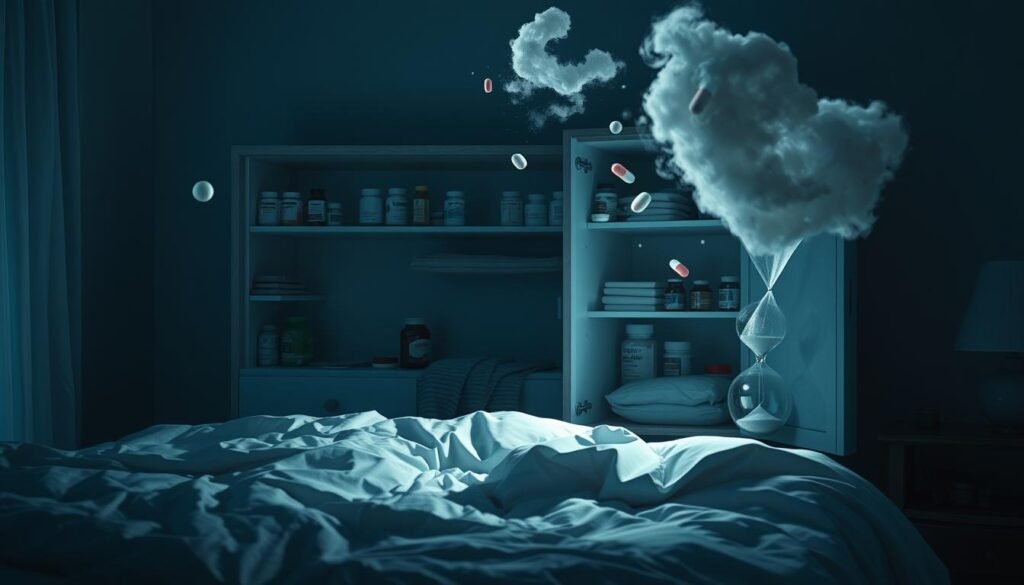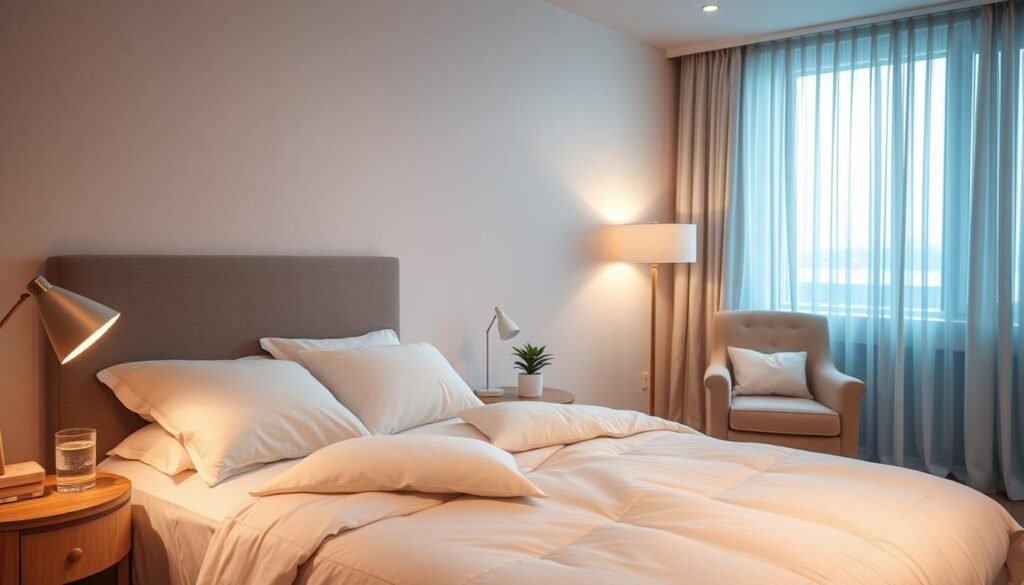Surprisingly, nearly 15% of American adults have had insomnia in the last month. This data comes from the CDC. Such a high number shows the urgent need for effective sleep aids, especially for those with anxiety. Finding the right over-the-counter sleep aid for adults with anxiety isn’t simple. There are many options to explore.
Over-the-counter (OTC) sleep aids can offer temporary help. But it’s important to know their role and limits. Lifestyle changes can be more helpful for long-term sleep issues, say experts.
OTC meds can make sleep better, but they aren’t a fix for good. This article will cover different non-prescription sleep aids, how they work, and why talking to a doctor first matters. For more details on safe use of sleep aids, check out this link here.
Key Takeaways
- About 15% of American adults struggle with insomnia.
- Over-the-counter sleep aids can help with sleep problems caused by anxiety but only for a short while.
- Changing your lifestyle can be more effective for long-term sleep issues.
- It’s crucial to talk to a healthcare provider before trying any sleep aid.
- Some common choices include aids based on antihistamines, melatonin, and herbal solutions.
Understanding Anxiety and Its Impact on Sleep
Anxiety is a mental health issue that brings too much worry and fear. These feelings can mess up daily life and harm sleep quality. For many, knowing how anxiety changes sleep is key. This is because anxiety can start cycles of insomnia that are tough to stop. Learning about anxiety’s effects can help people tackle their sleep problems.
What is Anxiety?
Anxiety includes different disorders like generalized anxiety disorder and panic disorder. It often shows up as constant fear, making relaxation hard. This worry can lead to physical symptoms like a fast heartbeat. These symptoms make it difficult to get good sleep.
How Anxiety Affects Sleep Patterns
The link between anxiety and sleep is not simple. Many find their sleep is badly disrupted by anxiety. They might struggle to fall asleep or stay asleep, feeling tired all day. Worries often grow at night, making it hard to find peace for restful sleep.
Common Symptoms of Sleep Disturbances Related to Anxiety
The signs of sleep problems from anxiety differ from person to person. Common symptoms are:
- Restlessness: Can’t keep still or calm in bed.
- Racing thoughts: Ongoing worries that prevent calmness.
- Physical discomfort: Night-time issues like tension headaches.
These issues make falling and staying asleep hard. Long-term sleep problems can make anxiety worse, forming a bad cycle. Finding the right treatments, like cognitive behavioral therapy, can help break this cycle.
If you want to get better at sleeping, looking into trusted resources is a good idea. Check out ways to manage sleep issues linked to anxiety.
The Importance of Sleep for Mental Health
Getting good sleep is key for your mental and overall health. Sleep and anxiety affect each other in many ways. Not getting enough sleep can make anxiety worse. At the same time, anxiety can stop you from getting good sleep. This shows why it’s important to keep up with sleep habits, especially if you’re dealing with anxiety.
The Connection Between Sleep and Anxiety
The link between sleep and anxiety is a strong one. Bad sleep can make anxiety stronger. This starts a hard cycle to break. If you have anxiety, you might lie awake with your thoughts racing. This keeps you
from sleeping well. Over time, this can make anxiety even worse. Getting enough sleep can make you feel better mentally and emotionally every day.
Consequences of Sleep Deprivation
Not sleeping enough can harm your mental health in many ways. These include:
- Impaired cognitive function
- Memory issues
- Increased stress levels
- Emotional dysregulation
- Higher risk of mental health disorders
Those who don’t sleep well might feel tired, grumpy, and have trouble focusing during the day. These issues make it harder to deal with anxiety and sleep problems. Realizing the impact of not sleeping enough shows why good sleep habits are vital. They help with better mental health and managing anxiety.
| Consequence | Description |
|---|---|
| Impaired Cognitive Function | Difficulty in focusing, problem-solving, and decision-making due to tiredness. |
| Memory Issues | Challenges retrieving information, affecting both short-term and long-term memory. |
| Increased Stress Levels | Heightened stress responses during daily activities due to lack of restorative sleep. |
| Emotional Dysregulation | Greater difficulty managing emotions, leading to mood swings or irritability. |
| Higher Risk of Mental Health Disorders | Sleep deprivation increases the likelihood of developing anxiety and depression. |
Best Sleep Aid For Adults With Anxiety Over The Counter
Finding the right sleep aid is crucial for adults facing anxiety-linked sleep problems. Knowing about the best over-the-counter sleep aids helps people choose wisely. There’s a variety of non-prescription products. They range from melatonin to calming antihistamines. This variety helps meet different needs.
Overview of Non-Prescription Options
In 2022, the sleep aids market was worth $67 billion. It’s expected to reach $130 billion by 2032. About 20% of adults suffer from occasional insomnia. This shows a big need for effective, non-prescription solutions. Options like melatonin, valerian root, and calming antihistamines are popular.
How Over-the-Counter Sleep Aids Work
OTC sleep aids’ workings are not complicated. Melatonin doses range from 1 to 10 mg. A dose of 5 mg is often suggested. Valerian root, in 300 to 600 mg doses, improves sleep and decreases disorders. Sedating antihistamines, such as diphenhydramine, are known for their soothing effects. They work by making the brain’s pathways relax and cause sleepiness. Knowing the right dosage and risks is key. It’s important to follow the label for safety.
Types of Over-the-Counter Sleep Aids
Finding the right OTC sleep aid is key for those struggling with sleep problems due to anxiety. Many people know about these products. But, understanding their effects and side effects matters when choosing wisely.
Antihistamine-Based Sleep Aids
Antihistamine sleep aids are popular for their ability to make people sleepy. Ingredients like diphenhydramine and doxylamine are common. Brands such as Advil PM, Unisom Sleep Tabs, and ZzzQuil are among the top choices. They work well for sleep but can cause dry mouth, constipation, and dizziness. Using them too much might lead to dependency.
Melatonin Supplements
Melatonin supplements are natural options for improving sleep. They help adjust the sleep-wake cycle. This is great for those who travel a lot or have odd sleep schedules. Though mostly safe, some might get agitated or need to urinate more frequently. Studies show melatonin can help late-night types get to bed earlier.
Herbal Sleep Aids
Herbal options like valerian root have a long history of use. Valerian is known for being mildly sedating without leaving you groggy the next day. People also use chamomile and kava to sleep better. However, they can have side effects like dizziness and stomach upset.
Other Non-Prescription Sleep Aids
Other choices include GABA supplements and CBD, which may help with insomnia and anxiety. These options are less regulated, so picking quality products is crucial. Using these OTC sleep aids correctly can be a big help for those dealing with anxiety-related sleep issues. If unsure, it’s good to get advice from experts, especially about anxiety and its impact on sleep. Find more information here.

The Benefits of Natural Sleep Remedies for Anxiety
Natural sleep remedies provide options beyond medicine for better sleep and lowering anxiety. They include herbal supplements, changes in lifestyle, and diet tweaks. These are designed to calm the mind and ensure a good night’s rest.
What Are Natural Sleep Remedies?
Natural sleep solutions for anxiety include varieties of herbs and practices. They aim to lower stress and help with sleep. Common ones are:
- Valerian root – It can cut down how long it takes to fall asleep.
- Chamomile – Often drunk as tea, it might help calm you down for sleep.
- Melatonin – This hormone helps control when you sleep and wake up. It’s good for getting to sleep faster.
Benefits of Using Herbal Sleep Aids for Anxiety
Herbal sleep aids come with benefits, especially for anxiety management. Some benefits are:
- They usually have fewer side effects than man-made drugs.
- Supplements like melatonin are proven to help you sleep longer and better.
- Herbs such as valerian and chamomile can make you feel more relaxed. This is good for your mental health.
Studies highlight these positives. For example, melatonin has helped various people sleep better. This includes those with anxiety-driven insomnia. Using melatonin for a short period is generally safe. Fast-acting forms may also work more quickly than slow-releasing ones.
Valerian is a top natural choice for anxiety and sleep issues. It may make sleep quality better over time. Continuous use may bring better results than using it now and then. Chamomile also helps in relaxing before bedtime.
When trying natural sleep aids, caution is key. How people react can differ. Knowing which options suit you best can ensure you benefit from these herbal aids.
Understanding Side Effects and Risks
OTC sleep aids can help with insomnia, but knowing the risks is key. Side effects depend on the medication and the person’s reaction. Common issues include feeling sleepy, moving with difficulty, and not focusing well the next day.
Common Side Effects of OTC Sleep Aids
Potential side effects include:
- Drowsiness and grogginess
- Dry mouth and constipation
- Dizziness and lightheadedness
- Changes in appetite and nausea
- Impaired attention and memory issues
Serious side effects might be allergic reactions or sleepwalking. Signs of an allergy include swelling, trouble breathing, or a rash. In such cases, seeing a doctor right away is critical.
Potential Risks for Specific Populations
Some people face higher risks with OTC sleep aids. Older adults may not shake off the medicated feeling easily. Also, women could have stronger side effects than men at the same doses.
Pregnant or breastfeeding folks need to be careful, as some ingredients impact the baby. Using sleep aids too often can lead to tolerance and dependency. It’s important to talk to a healthcare provider before starting. For more on sleep aid side effects, visit this resource.

When to Consider Non-Prescription Sleep Aids
Knowing when to try non-prescription sleep aids is key for good sleep and health. It’s important to know the difference between short-term and long-term sleep problems. Talking to a healthcare provider helps get care that matches your sleep needs.
Identifying Occasional vs. Chronic Insomnia
Short-term sleep problems often stem from stress or changes in life. These troubles can disrupt sleep for a few nights but typically get better on their own. Long-term insomnia lasts longer and can impact daily life and happiness. Looking at how you sleep can help figure out what kind of sleep problem you have. Non-prescription sleep aids might help if your sleep issues are short-term.
Consulting with Healthcare Providers
Talking to healthcare providers before trying a sleep aid is very important. They can check how severe your sleep issues are and look at your overall health. They also make sure the sleep aid fits your health needs, especially if you have ongoing sleep problems.
How to Use Sleep Aids Safely
To safely use non-prescription sleep aids, here are some tips:
- Start with the lowest recommended dose to assess effectiveness.
- Avoid mixing sleep aids with alcohol, which can amplify side effects.
- Be mindful of timing, taking sleep aids about 30 minutes before bedtime.
- Limit use to short-term periods to prevent dependency or tolerance.
- Monitor the effects of the aid on sleep quality and overall health regularly.
Following these guidelines helps improve sleep while keeping risks low. Understanding when to use non-prescription sleep aids helps people manage their sleep issues better.
| Type of Insomnia | Characteristics | Recommended Actions |
|---|---|---|
| Occasional Insomnia | Short-term sleep issues, often tied to stress. | Consider non-prescription sleep aids for a short duration. |
| Chronic Insomnia | Sleep issues lasting over three months. | Consult healthcare providers; consider comprehensive treatment plans. |
Tips for Enhancing Sleep Hygiene
Improving sleep hygiene can greatly boost sleep quality, especially for those with anxiety. It’s crucial to have a sleep schedule and a bedroom that promotes sleep.
Establishing a Consistent Sleep Schedule
Having a regular sleep schedule helps your body’s clock stay on track. Sleeping and waking at the same times every day strengthens the sleep-wake cycle. This makes falling asleep and waking up easier. Aim for 7-9 hours of sleep each night. If you need to change your bedtime, do it slowly. This helps your body adjust without harm. For natural sleep aids, consider warm milk or chamomile tea.
Creating a Sleep-Conducive Environment
Making your bedroom sleep-friendly is key to resting well. Pay attention to these areas to boost sleep hygiene:
- Lighting: Lowering lights at night helps signal your body it’s time to rest. Use blackout curtains to block outside light.
- Noise Control: Less noise means a more peaceful sleep. Try using white noise machines or earplugs to cut down on sound.
- Temperature: Keep your room between 65 and 72 degrees for ideal sleeping conditions.
- Eliminating Distractions: Keep tech out of the bedroom. A relaxing routine before bed can also help decrease distractions.
These steps help create a tranquil environment for sleep. Good sleep habits help tackle the effects of anxiety on sleep. For more information on anxiety and sleep issues, click here.

Alternative Approaches to Manage Anxiety-Induced Insomnia
Looking for new ways to beat insomnia can help those who can’t sleep due to anxiety. these methods offer additional or even alternative options to traditional meds. They help increase calmness and better sleep.
Cognitive Behavioral Therapy for Insomnia (CBT-I)
CBT-I is a top choice for tackling sleep problems linked to anxiety. It’s a program that helps change the negative thoughts and actions that mess with sleep. By learning new sleep habits and ways to handle anxiety, lots of people find they sleep much better.
Mindfulness and Relaxation Techniques
Using mindfulness and relaxation can really improve sleep and reduce anxiety. Techniques like meditation, yoga, and muscle relaxation help ease the mind and body into sleep. Doing these regularly can make a big difference in how relaxed and ready for sleep you are.
Here are some methods to try:
- Acupuncture
- Guided imagery
- Massage therapy
- Aromatherapy with essential oils
- Mindful breathing exercises
- Herbal remedies like chamomile and valerian root
These holistic approaches can really help those anxious about not being able to sleep. They aim to improve overall happiness and calm.
| Technique | Description | Benefits |
|---|---|---|
| CBT-I | A structured therapy focusing on changing sleep habits | Addresses sleep disturbances caused by anxiety |
| Mindfulness | Practices that promote present-moment awareness | Reduces intrusive thoughts and promotes relaxation |
| Acupuncture | Traditional Chinese therapy using needles to balance energy | May improve sleep quality for those with insomnia |
Conclusion
Finding the right sleep aid for anxiety is a personal journey. There are many non-prescription options like herbal teas, melatonin, and creams. Products like Garden of Life’s Sleep Well Tablets and Natrol’s Time Release Melatonin gummies show that specific needs can be met. Understanding what you prefer is key.
Non-prescription aids can help many people, but they come with possible side effects. For instance, valerian root may help some relax but cause vivid dreams in others. Always talk to a healthcare provider before starting any new sleep aid. This is especially true if you have health issues or take other medicines.
Using over-the-counter products, making lifestyle changes, and seeking professional advice can improve sleep and health. A good sleep strategy takes a holistic view. It should be personalized, considering how to best tackle anxiety-related sleep problems.